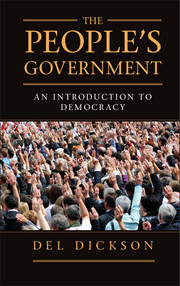Book contents
- Frontmatter
- Contents
- Acknowledgments
- Prologue
- 1 Liberty and Freedom
- 2 Freedom or Liberty?
- 3 Rights
- 4 Participation and Representation
- 5 Inclusion
- 6 Equality
- 7 Power
- 8 The Case against Democracy
- 9 The Case for Democracy
- 10 Building a Stable Democracy
- 11 Three Misconceptions about Democratization
- 12 How Democracies Die
- 13 How Democratic Is the United States?
- Glossary and Biographies
- Bibliography
- Index
- References
3 - Rights
Published online by Cambridge University Press: 05 August 2014
- Frontmatter
- Contents
- Acknowledgments
- Prologue
- 1 Liberty and Freedom
- 2 Freedom or Liberty?
- 3 Rights
- 4 Participation and Representation
- 5 Inclusion
- 6 Equality
- 7 Power
- 8 The Case against Democracy
- 9 The Case for Democracy
- 10 Building a Stable Democracy
- 11 Three Misconceptions about Democratization
- 12 How Democracies Die
- 13 How Democratic Is the United States?
- Glossary and Biographies
- Bibliography
- Index
- References
Summary
Rights are what the state and others owe you. Duties are what you owe to the state and others. In a democracy, rights are acknowledged by government assent; duties are justly imposed only with popular consent. Because different societies disagree about the proper balance of rights and duties, this is an especially interesting area for comparative study.
Some rights are tied primarily to liberty; other rights are tied primarily to freedom. Some rights have significant aspects of both liberty and freedom. Four issues help illuminate the complex relationship between rights and duties, and between individual and state: (1) where rights come from; (2) how different societies balance rights and duties; (3) negative versus positive rights; and (4) individual versus group rights.
WHERE DO RIGHTS COME FROM?
Where do rights come from? There are two basic answers to this question: they come either from a source superior to humans (natural rights), or they come from the same place as soylent green – the people themselves (positivism).
Most Americans believe in natural rights. According to this theory, God, Nature, or some other higher power endows human beings with their rights. People have rights simply because they were fortunate enough to be born human, and no earthly authority can justly limit or revoke these rights absent consent, or at least without good cause and due process. Natural rights exist apart from and above state, society, and positive (i.e., man-made) law.
Thomas Hobbes popularized the idea of natural rights in the mid-seventeenth century. He theorized that individuals are born with a full range of natural rights, including life, liberty, and the pursuit of self-interest. All legitimate political power flows from these individual rights (Hobbes vigorously rejected the Stuart monarchs’ claim to rule by divine right), meaning that the people are the ultimate source of sovereign authority.
- Type
- Chapter
- Information
- The People's GovernmentAn Introduction to Democracy, pp. 29 - 38Publisher: Cambridge University PressPrint publication year: 2014



